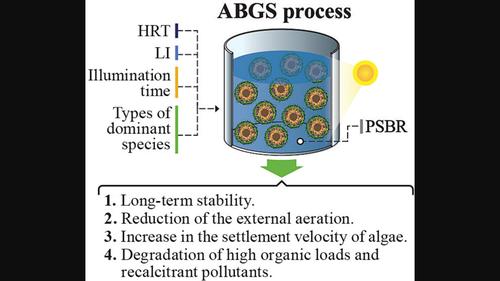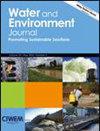分析操作条件对藻细菌颗粒污泥法处理废水性能的影响:综述
IF 1.8
4区 环境科学与生态学
Q4 ENVIRONMENTAL SCIENCES
引用次数: 0
摘要
本文章由计算机程序翻译,如有差异,请以英文原文为准。

Analysing the influence of operating conditions on the performance of algal‐bacterial granular sludge processes for waste‐water treatment: A review
This article discussed the effect of the main operating parameter involved in the operation of algal–bacterial granular sludge (ABGS) systems as promising biological processes for wastewater treatment. The focus was on the operational ranges reported in the literature capable of achieving better granule properties, good stability and high removal capacities. This review identified that hydraulic retention time (HRT), light intensity (LI) and light/dark periods were the most influential operating factors on the formation, stability, settleability and organic pollutant removal efficiency of ABGS. The discussion argued that ABGS systems enhance industrial and domestic wastewater treatment due to additional advantages that provide the symbiotic interactions to process performance, maintaining lesser operating costs concerning aerobic granular sludges (AGS) and microalgae consortia. This review will improve the understanding of the operation of ABGS systems and thus further expand possible operating combinations that help to enhance microbial interactions, microalgae growth and external aeration self‐sufficiency in further research with a focus on its scaling up.
求助全文
通过发布文献求助,成功后即可免费获取论文全文。
去求助
来源期刊

Water and Environment Journal
环境科学-湖沼学
CiteScore
4.80
自引率
0.00%
发文量
67
审稿时长
18-36 weeks
期刊介绍:
Water and Environment Journal is an internationally recognised peer reviewed Journal for the dissemination of innovations and solutions focussed on enhancing water management best practice. Water and Environment Journal is available to over 12,000 institutions with a further 7,000 copies physically distributed to the Chartered Institution of Water and Environmental Management (CIWEM) membership, comprised of environment sector professionals based across the value chain (utilities, consultancy, technology suppliers, regulators, government and NGOs). As such, the journal provides a conduit between academics and practitioners. We therefore particularly encourage contributions focussed at the interface between academia and industry, which deliver industrially impactful applied research underpinned by scientific evidence. We are keen to attract papers on a broad range of subjects including:
-Water and wastewater treatment for agricultural, municipal and industrial applications
-Sludge treatment including processing, storage and management
-Water recycling
-Urban and stormwater management
-Integrated water management strategies
-Water infrastructure and distribution
-Climate change mitigation including management of impacts on agriculture, urban areas and infrastructure
 求助内容:
求助内容: 应助结果提醒方式:
应助结果提醒方式:


